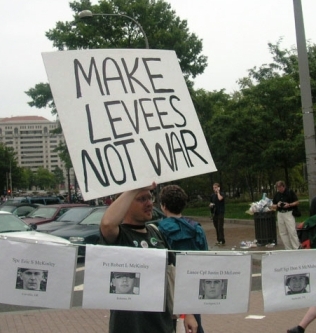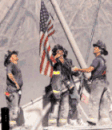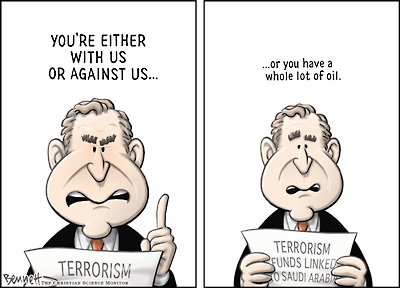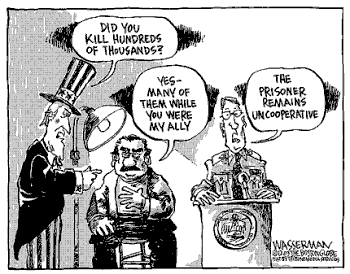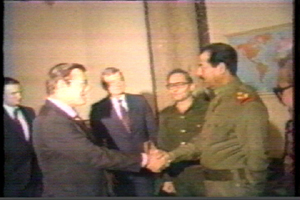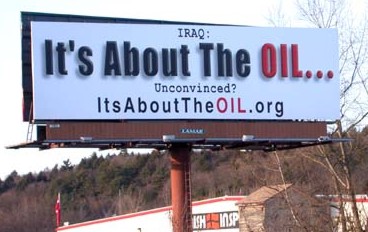Support Our Troops
If you
really want to show support, consider donating Hero Miles. If you do not have
frequent-flyer miles to contribute, check some of the other links on
this site for other opportunities. For example, I was able to donate
airline vouchers to a military dependent in need through Fisher House.
By giving just $800 in vouchers, I "sacrificed" more than
the Commander-in-Chief has.
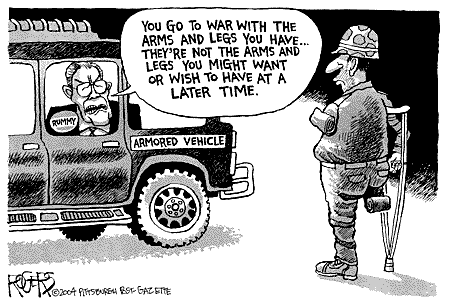
Copyright
2004 Rob Rogers Permission pending.
Quite a few of my students -- including some of those to whom I am
closest -- are soldiers or
reservists. Others are veterans or military dependents. One of my best
friends is a Vietnam veteran who has shared with me some of the hurt he
experienced on returning, particularly
in the liberal religious denomination to which we both belong.
At the onset of the Iraq war, the rallying cry to "support our troops"
caused me to think long and hard about what it means to be against this
war but to continue to respect and even admire the military people I
know.
(Nov
2007 update: Iraq
Veterans on Campus)
It seems to me that the
wrong -- though most common -- approach was simply to
fall in line behind the president and his mission, out of solidarity
with the troops he sent over. Because my relationships and friendships
with these people started before the war and will continue after it, I
do not see how my support for the troops is dependent upon my support
for the mission. For if it were, then my support for the troops would
require me to support any and all future missions that any future
president might initiate. If support for troops equals support for the
adventures of presidents, then we have a monarchy, or worse.
Clearly, then, this could not be the answer.
Another common response
from the left was, "Support our troops: Bring them home." I had some
sympathy with this position, and certainly people on all sides of the
debate were hoping to see the troops
return safely and soon. It was too facile, though. I heard a soldier on
a radio program reject this notion, and it occurred to me that we
cannot equate support the troops with rejecting
a policy that many of them endorsed.
One thing that is certain: supporting the troops and remaining silent
on the war are not the same thing. It has become a cliche to say that
we have the right to speak against the war because our soldiers are
sacrificing to defend that right. This begs the question of whether the
current mission is achieving the stated objectives. I do not happen to
think that the current mission has anything to do with defending free
speech. Given the proclivities of those running this war, I rather
think that the opposite is true. That is, free speech must be exercised
despite the waging of this war.
The notion of disrespect for the troops has been a straw man in the
debate over the Iraq war. In other words, the disrespect is not
happening this time around, and I am glad. Troops returning from
Vietnam thirty years ago were often treated poorly -- both by
the government and by the anti-war movement. Many within
the movement came to see the injustice of this, and even Jane Fonda
made a film (Coming Home ) that showed how poorly the veterans
were treated. (They still are -- the Bush Administration is
shutting down V.A. hospitals even though it continues to create new
disabled veterans every day!) This time, the protestors have been
careful to show respect for the troops, but some vocal advocates of
the war have chosen to ignore this. Thousands of this war's strongest
opponents are soldiers, veterans, or parents of
soldiers:
- A reservist I know and admire -- and who has willingly been
activated in the past -- would have joined this conflict had she been
called, but
she took her next opportunity not to re-enlist, because of her
misgivings about Iraq and her fears about what other adventures might
be added.
- A few weeks prior to the war, a former student and veteran
of the first Gulf War contacted me by e-mail to find out whether I
could help him find a protest to join.
- One of the few protests I actually attended was also
attended by a mother who had a son in Iraq. She supports her son, but
she did not support the mission he was on.
I have come to conclude
that support for the troops and support for the war are two
different things . People on both sides
of the question of whether this war was justified can have respect and
good will toward the troops involved. This support and good will does
not necessarily lead to either position.
One argument I have heard in support of the war is that U.S. troops
have the best training and intentions to ensure minimal suffering among
civilians and even among enemy combatants. It is acceptable for the
U.S. to wage war, it seems, because it does so more humanely than do
other countries. This argument makes little sense, but I present it
here because I have heard it several times and because it attempts to
translate respect for our military into
a reason to support the war.
I accept the contention
that the U.S. military tries harder than any other to minimize civilian
casualties, and even to provide for humanitarian relief after the
conflict. I would argue that this is true not only because of the
virtues of our individual soldiers but also because of pressure exerted
on the military following past debacles and even some civilian
massacres. The gains made by critics of the Pentagon are not sufficient
now to silence those critics. The other difficulty with this line of
argument is that even the most careful of attacks has already resulted
in many thousands of civilian deaths in Iraq, with over 2,500 allied
deaths and
untold Iraqi combatants killed.
These numbers do not reflect badly on our soldiers; they are the
responsibility of the president and of the Congress, and ultimately of
the
electorate. If we ignore this responsibility in the name of
"support" for our troops, we have walked away from our responsibilities
as citizens.
Finally, I have difficulty accepting the premise that those who oppose
the war are hurting the troops more than the president who has sent
them into harm's way. I also bear in mind that during a previous war of
questionable merit, this president used
his status as a "senator's
son" to
dodge participation. When Gen. Clark and Michael Moore brought up
this issue, they were rebuked, but the rest of the media are now
starting to understand the problem. See Moore's February 11, 2004
letter to President Bush for an explanation of the charges.
Remember that during the Clinton Administration, a lot of his opponents
had bumper stickers that read, "Draft Dodger for Commander in Chief?
" I have not seen one of those since January 2001, and would happily
put one on my car today!
 I think that the perspectives of the soldiers, sailors,
and marines are
very important -- and each has his or her own story and opinions. Blake
Miller became famous through this photo by L.A. Times photographer Luis Sinco. His
story is told in a thoughtful article by Jim Warren, "Former
Marine is 'Marlboro Man' No More." I think that the perspectives of the soldiers, sailors,
and marines are
very important -- and each has his or her own story and opinions. Blake
Miller became famous through this photo by L.A. Times photographer Luis Sinco. His
story is told in a thoughtful article by Jim Warren, "Former
Marine is 'Marlboro Man' No More."
November 2007 update: Mr. Sinco continued his contact with Cpl. Miller,
trying to save him from post-traumatic stress syndrome. He wrote "Two
lives blurred together by a photo" for the L.A. Times, and was interviewed
by Robin Young on WBUR.
For further thoughts about support for our troops in these troubling
times,
see the
comments of Rev. William
Sinkford, the president of the Unitarian Universalist Association.
About
"Bush Haters"
Critics of this war are often dismissed as Bush Haters, as
if we
only complained because we had some personal dislike for the man. In my
case, I had no
disdain for him prior to 2000 -- he has worked hard to earn my
disrespect. When I lived in Texas, he was my governor. I did not vote
for him, but I did not panic when he was elected. During the 2000
campaign, I considered him and Al Gore almost interchangeable, because
they were in many ways. I did not vote for either one of them, but I
did not hate either one of them either. I still do not hate either one
of them, but I really began to lose respect for President Bush when his
team -- led by
Katherine Harris and Karl Rove -- stole the election.
Since then, a slim "mandate" has been used to leverage a series of
radical domestic and foreign policies that are highly dangerous and
offensive. The Bush White House has been the most political ever, and
has implemented sweeping changes that maximize the financial freedom of
the top
1 percent while minimizing the social and political freedom of most
of the rest of us, all while engaging in an optional war at immense
human and financial cost. I use the word "radical" instead of
conservative, because I have nothing against conservatives, and I do
not consider Bush conservative in any traditional sense of the word.
Even Richard Nixon's attorney, John Dean, calls the current
administration "conservatives
without conscience."
Those of us who love this country
have an obligation to protect what is left of it from these people!
Almost 1,000,000 people have signed a petition to impeach the
president. This is not because we do not like him; it is because he has
broken his oath to uphold the constitution, and he has killed many
thousands of with an optional war.
|
Stay Informed
Don't rely solely on the Bush-dependent media
sources!

|
Bridgewater
Citizens for an Informed Community
Find out what is being done locally in response to the
war and terrorism. This local group sponsors debates and presentations
on a wide variety of relevant topics. People with opposing views are
always invited to attend and participate.
|

|
National
Public Radio
Supported by contributors, foundations, and government grants, NPR is a
robust news organization that airs well-produced news programs from a
variety of perspectives. All programs are archived and available online.
|

|
WBUR
Boston's NPR affiliate provides NPR news programs and locally-produced
programs. At certain times of the day it provides current news from the
British Broadcasting Corporation (BBC), which sometimes provides a more
independent perspective. WBUR's weblog on the war is
quite useful.
|

|
Pacifica
This alternative to public radio is free of government and corporate
sponsorship, and provides even more independent perspectives. Archived
programs are available from the Pacifica web site; links to affiliate
stations provide the ability to listen online.
|
|
